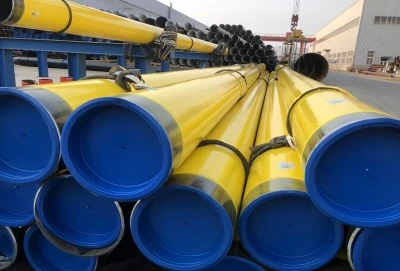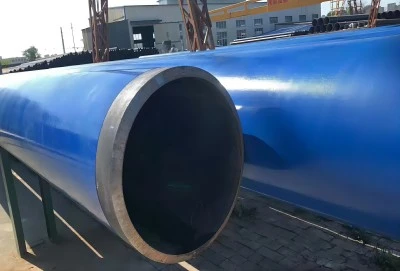Carbon steel pipes are widely used in various industries due to their strength and durability. However, they are susceptible to corrosion when exposed to harsh environments. To protect these pipes and extend their lifespan, different types of coatings are applied. Let's explore the most common coatings used on carbon steel pipes, focusing on epoxy coatings, polyurethane coatings, and corrosion-resistant coatings.
|
|
|
Epoxy coatings:
Epoxy coatings are conceivably of the most outstanding and fruitful cautious layer that carbon steel lines can have applied. These coatings are known for their durability, chemical resistance, and excellent adhesion. Epoxy coatings are formed by mixing two fragments: a hardener and a sap. When these components are combined, a strong, cross-linked polymer that firmly adheres to the surface of the pipe emerges.
The application of epoxy coatings typically involves multiple steps. To start, to ensure attachment, the outer layer of the line is ready and completely cleaned. Rust, scale, and different pollutants can be eliminated utilizing sandblasting or other grinding procedures. Groundworks are typically applied to improve grip and provide additional erosion protection. The epoxy covering is then applied in no less than one layers, either by showering, brushing, or plunging.
Epoxy coating carbon steel pipes has numerous benefits. They offer a great deal of protection against wear and tear, scratches, and compound assault. Epoxy coatings improve pipeline flow efficiency by smoothing surfaces and reducing friction. Because of their versatility and capacity to endure high temperatures, epoxy coatings are likewise proper for many applications.
Epoxy coatings appear in changed plans, each wanted to meet express necessities and standard circumstances. For instance, underground pipelines frequently employ blend-supported epoxy (FBE) coatings due to their remarkable resistance to cathodic disbondment. On the other hand, liquid epoxy coatings are continually thoroughly enjoyed for field applications and fixes due to their convenience.
The thickness of epoxy coatings can fluctuate in view of the application and prerequisites. Although some coatings have thicknesses as high as 1500 microns, the typical thickness of a high-performance coating is between 200 and 1000 microns. The coating thickness is carefully controlled to ensure optimal protection without compromising the performance of the pipe or adding unnecessary weight.
One of the main advantages of epoxy coatings is their long service life. Contingent upon how well they are applied and kept up with, epoxy coatings can defend carbon steel pipes for 15 to 30 years or considerably longer. Due to their durability, they are an economical choice for numerous industrial applications.
Polyurethane coatings:
Polyurethane coatings are another well-known option for protecting carbon steel pipes. These coatings are notable for their versatility, protection from impacts, and UV insurance. A tough, elastic polymer is created when a polyol and an isocyanate react to make polyurethane coatings.
Coatings made of polyurethane adhere to the same application methods as coatings made of epoxy. To get things started, the surface of the pipe is cleaned and prepared, and a primer coat is frequently applied to make the glue stick better. After that, the polyurethane coating is typically applied with a brush or a sprayer. A few high level frameworks utilize a two-part splash application, where the polyol and isocyanate are blended not long before application, to accelerate the relieving system.
Coatings made of polyurethane can have varying degrees of gloss and color retention. This stylish point of view may be significant in certain applications where the presence of lines is a thought. Pipelines can be assortment coded thanks to the finish's customization, which can be significant for security and recognizing evidence.
Even though polyurethane coatings have a shorter useful life than epoxy coatings, they actually provide long-term protection. Contingent upon the detailing and the climate, polyurethane coatings can safeguard carbon steel pipes for 10 to 20 years or more.
Corrosion-resistant coatings:
Corrosion-resistant coatings encompass a broad category of protective layers designed specifically to combat the effects of corrosion on carbon steel pipes. These coatings work through various mechanisms to prevent or slow down the corrosion process, extending the lifespan of the pipes and maintaining their structural integrity.
One common type of corrosion-resistant coating is zinc-rich primers. These coatings contain a high percentage of zinc particles, which act as a sacrificial anode. When the coating is scratched or damaged, exposing the underlying steel, the zinc particles corrode preferentially, protecting the steel substrate. This galvanic protection mechanism makes zinc-rich primers particularly effective in harsh marine environments or areas with high humidity.
Another important class of corrosion-resistant coatings is barrier coatings. These coatings work by creating an impermeable layer that prevents corrosive substances from reaching the steel surface. Epoxy coatings, as mentioned earlier, fall into this category. Other examples include phenolic coatings, which offer excellent resistance to acids and other aggressive chemicals, and fluoropolymer coatings, known for their exceptional chemical resistance and non-stick properties.
Ceramic coatings are gaining popularity as a highly effective corrosion-resistant option for carbon steel pipes. These coatings are typically composed of inorganic materials such as silica, alumina, or zirconia. Ceramic coatings provide excellent protection against both chemical attack and abrasion. They can withstand extremely high temperatures and are often used in demanding industrial applications such as oil and gas processing.
Nanocomposite coatings represent a cutting-edge development in corrosion protection. These coatings incorporate nanoscale particles or structures into the coating matrix, enhancing properties such as barrier protection, mechanical strength, and self-healing capabilities. For example, some nanocomposite coatings can release corrosion inhibitors when damage occurs, providing an additional layer of protection.
Thermal spray coatings are another effective method for protecting carbon steel pipes against corrosion. In this process, molten or semi-molten materials are sprayed onto the pipe surface, creating a dense, adherent coating. Materials commonly used in thermal spray coatings include aluminum, zinc, and their alloys. These coatings provide excellent corrosion resistance and can be applied in thick layers, making them suitable for severe service conditions.
Epoxy Coated Carbon Steel Pipe manufacturer:
When it comes to sourcing high-quality epoxy coated carbon steel pipes, choosing a reliable manufacturer is crucial. One such manufacturer is the Longma Group, which supplies a range of epoxy coated carbon steel pipes suitable for various industrial applications.
The Longma Group offers epoxy coated carbon steel pipes with outer diameters ranging from 60.3mm to 1422mm. This wide range of sizes allows customers to find pipes that meet their specific project requirements, whether for small-scale installations or large industrial pipelines.
The wall thickness of the pipes supplied by the Longma Group varies from 6.02mm to 50.8mm. This range of thicknesses provides options for different pressure ratings and structural requirements. Thicker walls are generally used for high-pressure applications or where additional strength is needed, while thinner walls may be suitable for low-pressure systems or where weight is a consideration.
For those interested in learning more about the Longma Group's epoxy coated carbon steel pipes or to discuss specific requirements, the company invites potential customers to contact them at info@longma-group.com. This direct line of communication allows for detailed discussions about product specifications, customization options, and technical support.














